How many words for one God? Martin Prudký on the Colloquium Biblicum symposium.
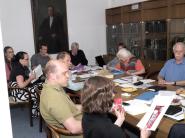
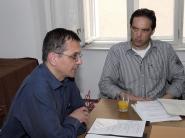
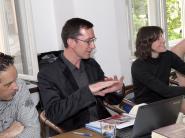
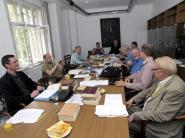
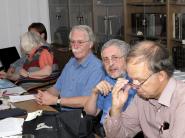
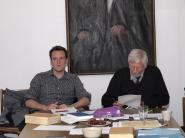
9 May 2011
9. 5. 2011; By: Marie Kohoutová; Translation: Pavla Horáková
On April 27th – 30th 2011, the Charles University Protestant Theological Faculty hosted the 19th year of the Colloquium Biblicum international symposium. Two dozen members of this exclusive society of Bible experts from different European countries studied important aspects of Biblical texts that have inspired the religious systems of Judaism, Christianity and Islam and have been instrumental for the cultural traditions of European civilisation. In the following interview, the main organizer of the Colloquium Biblicum, doc. ThDr. Martin Prudký, Charles University Prorector for Student Affairs and head of the Department of Old Testament Studies at the Protestant Theological Faculty, talks about this year’s symposium whose theme focused on the linguistic and rhetorical aspects of the “monotheistic” concept of god in Biblical and related traditions.
|
doc. ThDr. Martin Prudký, Charles University Prorector for Student Affairs and head of the Department of Old Testament Studies at the Charles University Protestant Theological Faculty |
Why is it important to study the linguistic and rhetorical aspects of Biblical texts at the beginning of the 21st century? Because even in the 21st century the Bible remains a major source of inspiration for our civilisation and culture, and certain intellectual concepts, expressions and sayings are at the very foundations of this civilisation. The theme of this year’s colloquium, dedicated to the issue of monotheism, is also relevant in that even in our culture some monotheistic religions or groups adhering to them manifest a certain exclusiveness but also intolerance towards “the others” who are then “as a consequence” perceived as enemies. Meticulous and critical research into ancient texts that are at the foundations of those religions and have been the pillars of our culture is very important in that it can show how many possibilities there are for creating relations, namely among the religions referring to the Bible. |
So can we say that until there is peace among the religions there will be no peace among us, as the saying goes?
Yes, that is Hans Küng’s thesis from his world ethos project – until there is peace among the religions, there will not be peace on earth, political peace, peace among people. It is very true. Even in our times we can see that religions and religious motivation are often used as an ideological weapon, that their potential is being used as an instrument by those in power who wish to use it for their own purposes. And it is our task as theologians, who deal with these things critically, to study them and explain – for instance to analyze the potentials of certain canonical texts and explain for example how dangerous their “sharp rhetoric” can be if we direct it towards ends the texts themselves do not reckon with.
The historical and ideological context of Biblical texts was another topic on the agenda. What is the crux of the matter there?
It may come as a surprise to many people that as regards the Bible and ancient Israel, monotheism is not some given, indisputable thing, a dogmatic axiom with general validity. Biblical themes, Judaism and the later Christian tradition are often regarded as “naturally” monotheistic. As if it were given and obvious that there is only one God. But monotheism, even in ancient Israel, emerged under specific historical conditions and its features gradually formed in a process that had its stages and reforming changes. And we are trying to study the concrete aspects of this very complex process – where and how in history this process can be traced, which Biblical texts contributed to the emergence of monotheism and in what way. It is a fairly detailed and difficult research.
The Charles University Protestant Theological Faculty is the single organizer of the colloquium. What is its history and who is it meant for? Is it only for researchers or is it open to students and doctoral students?
The Protestant Theological Faculty organizes the colloquium every year and the core of the group dates back to the seminars from the time before the fall of communism. Since 1989 the Department of Old Testament Studies has organized these colloquia on a regular, annual basis. Some of our colleagues from this country and abroad have taken part in all of the 19 years. But every year new people join in. The colloquium is mainly meant for researchers, it strives to be a platform for dialogue, a sort of internal seminar for the mutual presentation of the results of our work. Of course, it is open to students, too, mainly to doctoral students from our department. They contribute actively to the programme with their own papers. There are always a number of master’s students who are interested in these issues.
Thank you for talking to iForum.
